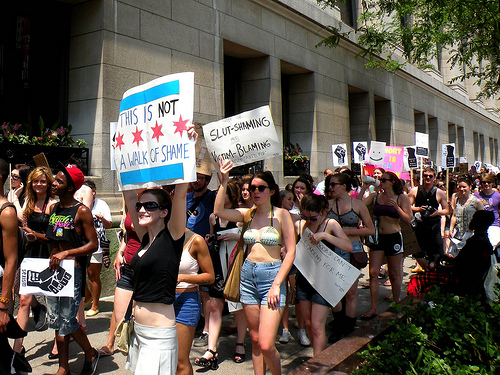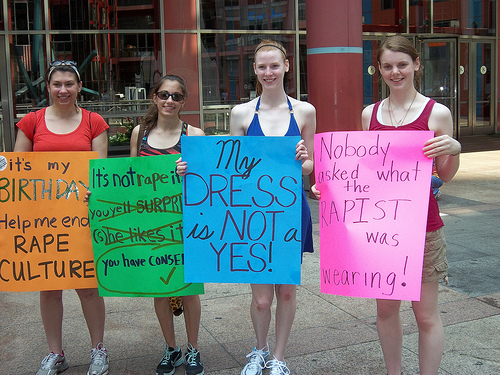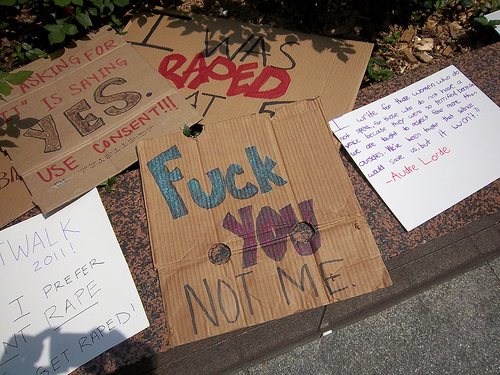If feminism is to remain relevant, it needs to become more intractable, not less, and it needs to see itself working beyond the landscape of the personal.

In 2011, I spoke at the inaugural Chicago Slutwalk rally as a member of Gender JUST. On the way to the event on the train, I read my handwritten speech over and over. It was jotted down in my cryptic handwriting, the result of too many years of almost exclusively writing on the computer, and I needed to familiarise myself with the words. I was terrified I’d find myself surrounded by hundreds of people waiting patiently—or not—as I struggled to decipher my own scribbling.
The gods of cursive were with me that day, and the speech went off smoothly. I remember looking out at the sea of faces, so many faces, so many angry and excited and flushed and laughing and animated faces, on various points across the gender spectrum, all riotously exploding with the word “SLUT” emblazoned across bodies, t-shirts, and hundreds of accessories and signs, so many, many signs.
In 2011, as I marched with the thousands who showed up on a glorious summer day and then stood on a makeshift dais delivering my short speech, I couldn’t help but be excited at the prospect of watching what, to me, was a long-dormant and almost dead movement, feminism, surge back in meaning and relevance.
I spoke again at this year’s Slutwalk, and found myself wondering where all the energy had gone. The outfits were back, as were the defiant and often funny signs, even if the crowd was noticeably smaller. As I looked over at the crowd, again, I wondered why nothing much had changed and if, this time, Slutwalk meant the end and not the beginning of feminism.
Slutwalk came about because a Toronto policeman said that “women should avoid dressing like sluts in order not to be victimized.” That he said it at all was bad enough, but that he said it at a crime prevention forum made it much worse, because this implied that women who dressed a certain way deserved what they got. His words ultimately provoked countless discussions, and women marched in massive numbers to take back and reclaim the word, “slut.” The popularity of Slutwalk last year led some to proclaim that it was the future of feminism.
“Feminist” is not a label I wear well, often, or with much grace. As I explained in an interview with Feminists for Choice, I’ve long been conflicted about what passes for feminism, especially in the US, where the term is unfortunately associated with white, privileged women whose interests lie in birth control and abortion rights, and little else beyond. In fact, even the language of rights, as problematic as it can be for the way it privileges the individual subject over a systemic analysis of power relationships, has been dispensed with by mainstream American feminists. They now prefer the spectacularly neoliberal term “reproductive justice,” which attempts to make the decision to have an abortion seem even more ethereal and immaterial, disconnected from material realities like poverty and inequality that determine the, yes, right to do so.
In issues of gender and sexuality, I find mainstream US/North American feminists mystifying in their contradictions and their inability to think of the relationships of power and economics that undergird what they celebrate as personal battles. For instance: In her book, Cinderella Ate My Daughter, Peggy Orenstein sets out to decode our cultural obsession with princesses, which both hyper-sexualises little girls and disempowers them with constant reminders that they need to obsess about their looks. Cinderella has some interesting insights, but Orenstein can’t see past her own contradictions. Complaining about the children’s book, The Paper Bag Princess, where the heroine dumps an ungrateful prince “and skips off into the sunset happily ever after, alone,” she reveals that she would consider her daughter’s life incomplete without marriage: “[not marrying is] not progress, that’s payback” and, “I do not want her to be a fish without a bicycle; I want her to be a fish with another fish…I hope she will find her Prince (or Princess) Charming and make me a grandma.” It never occurs to Orenstein that a culture which obsesses about little girls as princesses is also a culture that wants to see them tied to marriage and the disempowering myth of a life lived in a perpetual state of “happily-ever-matter,” as we see in the obsession with Kate Middleton’s newly minted purity.
Despite all these issues, and the fact that I often cringe when asked if I’m a feminist, I usually answer in the affirmative because I still think the word, like “queer,” bears a potentiality that may not rupture but still holds a ghostly promise or threat of change.
The fact that Slutwalk originated with a police officer’s sexism especially resonated with me. Years ago, I had my laptop stolen from the Chicago back porch where I had left it unattended for a few minutes. The police sent over two cops, one of whom explained my carelessness to me, “Look at this way: if you stood naked in your window, would you blame anyone if they came here and did something to you?”
That anecdote resonated with the 2011 audience, and it was the first time I’d spoken about it in public, even as I also addressed the structural issues of neoliberalism that faced the queer community. I also know what it’s like to be shamed for my sex life: in 2006, two white gay men and self-proclaimed lefty activists, Jeff Edwards, formerly of Queer to the Left, and Doug Ireland, then a writer at The Nation, made a public statement about my sex life in an effort to discredit my political work (I’ve written about the incident here). At the time, Slutwalk provided a platform—a necessary one—to openly discuss and begin to combat the deep sexism and misogyny that pervades our public and private lives, even in the supposedly more enlightened worlds of left organising.
Over the next few months, Slutwalk was both praised and criticised. Critics pointed out that reclaiming “slut” is problematic when the term is often used to demean and infantilise women of colour. I find that critique in itself insulting: it assumes that women of colour are helpless and passive, forever caught in the role of victims. It’s also an essentialising argument which assumes all women of colour hold the same views. I’d also argue that privilege, such as the privilege of calling oneself a slut—is not a white thing in itself; so much left analysis pretends that communities of colour don’t or can’t reproduce privilege or are somehow untouched by capitalism/neoliberalism.1
 But it wasn’t until I read “An Open Letter to Slutwalk,” on the Puget Sound Anarchist website, that I found a critique that resonated with me. I agree with its central thesis, that Slutwalk’s “faith in a fatherly liberal government neglects the investment that capitalism, the state and the prison industrial complex (PIC) have in perpetuating rape culture and monopolizing “violence” as well as “justice”. To me, what this referenced was exactly what seemed to have been left out of Slutwalk. While I’m not entirely sympathetic to the idea of a “rape culture” either, it did feel like discussions emerging from Slutwalk were centered around highly personalised narratives which ignored the ways that feminism has historically been about resisting structural imbalances, like economic and political inequality.2
But it wasn’t until I read “An Open Letter to Slutwalk,” on the Puget Sound Anarchist website, that I found a critique that resonated with me. I agree with its central thesis, that Slutwalk’s “faith in a fatherly liberal government neglects the investment that capitalism, the state and the prison industrial complex (PIC) have in perpetuating rape culture and monopolizing “violence” as well as “justice”. To me, what this referenced was exactly what seemed to have been left out of Slutwalk. While I’m not entirely sympathetic to the idea of a “rape culture” either, it did feel like discussions emerging from Slutwalk were centered around highly personalised narratives which ignored the ways that feminism has historically been about resisting structural imbalances, like economic and political inequality.2
Coincidentally, over the last year so, I’ve also become more involved with the anti-PIC and abolitionist movement. My work has greatly informed my perception of Slutwalk and my analysis is reflected in the speech I gave this year, reproduced below.
If Slutwalk is to remain relevant, it needs to become more than a gathering where people share stories about their abuse. Without a critical self-awareness and a willingness to address and act upon the structural, economic, and political problems that face women and others, Slutwalk is in danger of becoming the Halloween of feminism: the one day of the year when women feel empowered to dress in scanty clothes and call themselves sluts, but which leaves them without the power with which to actually make and create the kind of change that goes beyond an Obama slogan.
There is nothing insignificant about the demand that people not be harassed or worse for how they dress, but reclaiming “slut” is only the beginning. There is a particularly vapid form of activism that has overtaken the left-progressive world, where mostly people of colour and other oppressed groups engage in “story-telling.” This works like a drum circle, an endless chanting of personal woes that drowns out the structural components of capitalism, and allows for the construction of a fiercer, more powerful neoliberalism that uses the realm of the personal to erase our consciousness of the destruction of our social, political, and economic resources.
If feminism is to remain relevant, it needs to become more intractable, not less, and it needs to see itself working beyond the landscape of the personal.
Below, without further ado, is the speech I gave at the 2012 Chicago Slutwalk. My thanks go to the very gracious organisers for providing a space for these words. The words above are my own, these below are Gender JUST’s contribution to the event.
Slutwalk 2012
Thank you, to the organisers, for inviting Gender JUST to the event again; we’re deeply honoured to be here.
As we all know, Slutwalk came about primarily because of a need to push back against the sexual harassment of those deemed too slutty, too sexual, too much. Over the last year, Slutwalk has provoked, incited, and created a necessary wider public conversation about sexuality and the public domain. We support the event, and we are especially heartened to find that this year the conversation is expanding to consider sexual harassment and the policy of sexuality more generally [by specifically asking that we address the issues facing trans and gender-non-conforming people].
At Gender JUST, we know too well what sexual harassment looks and feels like for those considered outside the pale of normative gender and sexuality. Like so many others, we have watched with concern the reports of trans men and women harassed for the way they look and, too often, killed outright. We stand with the organisers of Slutwalk in calling for an end to shaming and the violence that accompanies it. We denounce the idea that anyone should be judged, humiliated, maimed, or killed because they fail to fulfill society’s illusory ideas of propriety or because they are not feminine or masculine enough.
As a grassroots organizing group committed to interrogating gender and sexuality within the context of neoliberalism, Gender JUST is also committed to seeking an end to gender violence—and make no mistake, harassment is violence— but we call upon our wider communities to consider what that looks like within the network of institutional violence that surrounds us all.

We denounce slut-shaming and violence but we also question where, exactly, our collective criticism of that might take us. We hear and understand the push for more policing of the police who harass us, but we have to ask: can we also push for a dismantling of the police state itself? In highly public cases like that of Drew Peterson, recently indicted for murdering his wife, we hear and understand the sense of triumph on the part of many who see this as an important victory, but we are troubled by the violence of exultation and the over-investment in the prison industrial complex as a means to bring an end to violence.
We ask for a deeper, more complicated understanding of harassment and violence, one that considers the violence of the state and the broader social and political factors that create and sustain violence. For instance: in recent murders of trans women in Chicago, and there have been too many, the claim is often made that they were “killed for expressing their true selves.” Such statements result from a personalising of these deaths, and allow us to forget the institutional violence behind them. In Chicago and elsewhere, trans sex workers are not killed for expressing themselves, they are killed because the system has failed them. These are terrible deaths, and all such acts of violence are tragic and senseless. But to say that they are “murdered for simply being themselves” is deeply misleading. We don’t know that. What we do know is that trans people, unless they have access to privilege, suffer from a system that denies basic resources to transgender people, many of whom have no other choice but to make their living in a dangerous street economy. They are shut out of resources and “social service” agencies like the Center on Halsted which police them even as they get funding for their “trans-inclusive” programs. Trans people are harassed by the very cops who then push for their beatings and deaths to be defined as “hate crimes”; [the enactment of hate crime legislation does nothing to end violence; it only funnels more people into the rapidly-expanding prison industrial complex].
When we only speak of people being harassed and killed for their identity, or what they looked like, we are ignoring the greater systemic problems that puts trans people in danger in the first place. When we place the burden on an individual’s identity, we are in effect personalising greater systemic and societal problems.
We stand with Slutwalk in calling for an end to violence and harassment; we also call for an end to invoking the state for more and better policing as alternatives to violence and harassment. The problem with violence and harassment will not be solved by making and training better, nicer, less sexist cops—we have to understand that the entire system of policing and state surveillance is structured to take advantage of the sexism, misogyny, and economic inequality that lies at the heart of the police state. And make no mistake: ours is a police state.
Gender JUST stands for an end to violence and harassment, and we believe that will only come about when we dismantle the prison industrial complex, and if we think of alternatives like transformative justice projects.
Thank you, and join us.
1To be clear: this is not one of those specious “reverse racism” arguments. I’m simply pointing out the (neoliberal) left’s inability to consider the full extent of inequality and its fetishisation of diversity. For more on neoliberals of the left and neoliberals of the right, see Walter Benn Michaels, “Against Diversity.”
2 I discuss the political uses and mis-uses of “rape culture” more extensively in my book project, Strange Love.
Don’t plagiarise any of this, in any way. I have used legal resources to punish and prevent plagiarism, and I am ruthless and persistent. I make a point of citing people and publications all the time: it’s not that hard to mention me in your work, and to refuse to do so and simply assimilate my work is plagiarism. You don’t have to agree with me to cite me properly; be an ethical grownup, and don’t make excuses for your plagiarism. Read and memorise “On Plagiarism.” There’s more forthcoming, as I point out in “The Plagiarism Papers.” If you’d like to support me, please donate and/or subscribe, or get me something from my wish list. Thank you.
